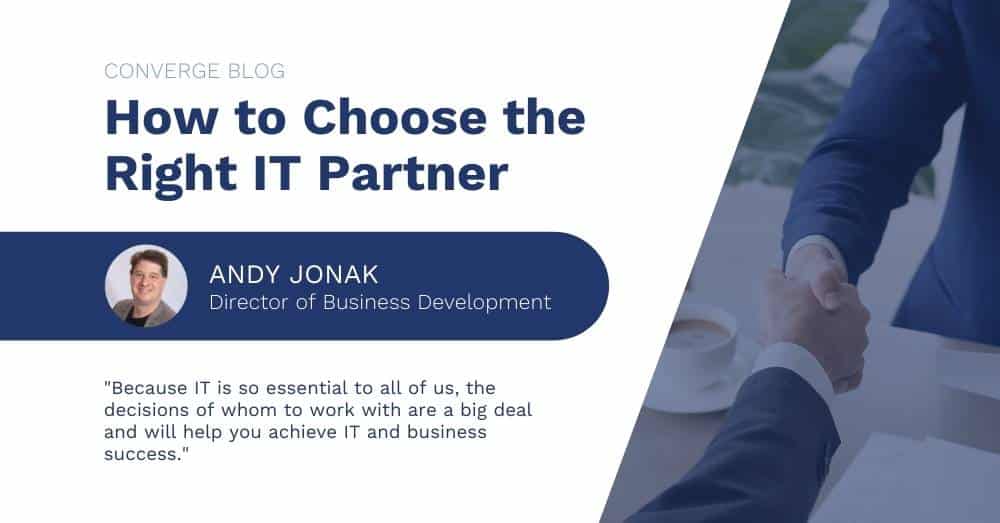Your IT environment is one of the critical areas that help your firm succeed. IT (no matter what or where it is) is one area of your business that can help you innovate and differentiate you if you embrace it, or it will hold you back if you treat it as only another expense. The importance of that gets lost in the shuffle. One of the significant factors to help determine where IT will sit on that spectrum of using IT to innovate or using IT because you have to is the partners with whom you choose to work. So, let’s get back to basics and explore how and why you need to choose the right IT partner(s) to serve the needs of your business.
But first, let me address the elephant in the room: price. Price is, and always will be, important, no doubt, but if you want excellent IT solutions and excellent IT resources, they are not cheap—from any firm offering them.
We all know that it is the nature of IT. But—and this has been my point for years—the pricing you will see will be about the same amongst most IT solution and services providers in the market. Stuff cost what it costs, and resources (people) cost what they cost. Sure, some charge a little more and some a little less, but you’d be hard-pressed to find prices from good, competent IT partners that are much more expensive or much cheaper than others for the same solution or service. If one of our Senior Architects costs $225 per hour and some other firm has someone for $100 per hour with supposedly the same skill set and experience, do you think they are of the same caliber? Probably not, and we all instinctively know it, especially if we’ve been in IT for a while.
What is my point? If you are a company that looks at price and price alone, then firms like Converge and the many great partners like us are probably not a great fit for you. And that’s OK. But, if like all of our customers, you care about the company we are, the resources and value we bring, and our long history and experience while providing solutions and services at pretty much the same price, then let’s remove price from this discussion.
Why Choose the Right IT Partner
Let’s start with why you would choose an excellent IT solution and services partner to work with you. As I said upfront, IT is essential to all we do. Whether it’s on-premise, in the cloud, or someone else’s data center, IT is a foundational—and critical—component of keeping our businesses not just running, but thriving.
When you hire people for your business, you always want the best people you can get for the money you are willing to invest. We all want that. We want people who can help us grow, stand out, bring value that we feel is proportional to what we want to pay them, and hope they “bring it” to help us become a much better company because they joined us. We expect the value they bring will outweigh the investment we’ve made. That’s the goal. Realistically, do we always get that in the people we hire? No, but it’s what we strive for in all of our hires.
The same is the case with your IT partners: You want partners that understand your business and what is needed to help you build/improve/transform your IT to make you a better company. We want to feel like we are getting more from them than we’re giving. I’m not saying an unfair give and take where one party takes advantage of the other, but a situation where both parties feel their investment is worthwhile. That’s just good business practice, and isn’t that what we all want? Of course, it is. It’s not always as simple as that, but it’s worth striving for that in all things and in working with your IT partners and customers.
A good IT partner can help you understand how to use IT to help meet your business goals and objectives. A subpar partner can not only NOT help you meet your business goals and objectives but can hinder your ability to do so. That’s how vital the right IT partners are and why you should choose carefully to get the most value from your partnerships.
How to Choose the Right IT Partner
Now, let’s talk about how to choose the right IT partner. Understanding the why will help you decide how to choose the right IT partners. Many of these are common sense, but they are so powerful they need to be stated.
The first is skills. It seems so obvious, but they must have the IT skills you need. Your decision to select an IT partner can’t be based solely on if you like them or not, but that is important—see my bullet below. It has to be more than just because you know them or have worked with them for a long time.
Questions to consider:
- Do they have skills in the areas you need?
- Can they demonstrate those skills to you and your firm very clearly?
- Do they have enough resources?
We’ve seen many IT solution providers that have one or two experts in a specific area, even though they have a team of many more people. These firms get by on what we call the “hero syndrome.” We are all familiar with it. It occurs when an organization has one or a few people who provide most of their value, and these few contributing resources are a big part of making these firms successful.
The challenge with this is that customers eventually see that you have a small number of “rockstars” and want only them. The firm then hits a brick wall and can’t scale because everyone wants only those few people. Now, to be realistic, it’s difficult for a firm to have a significant abundance of these types of highly paid, technical resources, but it can’t be only one or a few. We’ve seen it time and time again.
You want to choose a firm with lots of “rockstars” in those areas you need for your business, and it needs to be very clear to see that that is the case. You want to make sure the potential partner brings their “A-Team” all the time.
This one is common sense, and I believe is the most important: In choosing an IT solution and services provider, you want a firm that has done what you are looking to do—and has done it a lot. You wouldn’t go to a doctor or auto mechanic that hasn’t performed the specific surgery you need or the repairs you need for your car. You go to someone who’s done it before repeatedly.
I’ve given many presentations to our customers and prospects over the years, and one of the biggest things that customers or prospective new customers want to understand is where we’ve done it before. They also want to know what we do, but they really want to know where we’ve done it before.
Consider this scenario: A new prospective healthcare customer is deciding between another solution provider and our firm. The other solution provider has not worked with many healthcare customers. In contrast, we have worked with dozens of healthcare customers in all facets of IT over the past 20 years, including some of the largest in the country. Who seems a more attractive choice?
Perhaps this example is a bit self-serving and purposely so.Still, we work with many different customers in many different industries and can easily demonstrate that. We feel that’s what makes us endearing to our customers and why they feel comfortable working with us. We’ve been there and done that before—a lot.
To further illustrate my point, take a look at the number of long-term customers an IT partner has, as this is an excellent indicator of future success in working with them. Suppose many of their customers have been doing business with them for a long time. That’s reflective of great relationships and customers feeling as if they continually get value in the solutions and services they are provided. If an established firm has many new customers and ONLY new customers (this doesn’t apply to new IT solution providers just starting out), this is a big red flag and area of concern.
We’ve said this for a very long time: We are looking for customers, not transactions. We are not looking only to make a sale to our customers. We want relationships that enable us to be strategic advisors, and we want customers that want to work with us continually. Wouldn’t you want that as well?
A great indicator of a partner’s success and longevity is not only the number of customers a firm retains over time but their salespeople too. Sales (and particularly IT sales) is very volatile, with sales team members taking new positions regularly. We all know sales is a tough job. The number of salespeople that have been at a firm for a long time reflects the culture, which is an indicator of success and hopefully, foreshadowing. Many of the salespeople at our company have been with us 10, 20 or more years, which shows something.
The last point is a bit more subjective but no less critical: You must be comfortable with your IT providers. You must like the people you deal with and feel they are a stand-up firm, and your interactions across the board must feel good and feel right. Your gut will tell you, and you’ll figure that out quickly. Your first impressions about people and firms are generally correct, and you should listen to them. If you do not feel good, then, of course, you shouldn’t deal with them.
That’s my take on why and how to choose a good, ideally great, IT partner. As you can see, it’s not rocket science, as much of what I talk about is good old common sense, but I believe it’s powerful stuff and critical to how and why you choose your IT partners. Because IT is so essential to all of us, the decisions of whom to work with are a big deal and will help you achieve IT and business success.




